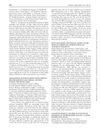Search
for
Sort by
Research
360-390 / 1000+ resultsresearch Stroke Risk Factors Unique to Women
Women have unique stroke risks due to hormones, contraceptives, pregnancy, and menopause.

research Age-Related Differences in the Reproductive and Metabolic Implications of Polycystic Ovarian Syndrome: Findings in an Obese, United States Population
Older obese women with PCOS have higher cardiovascular and metabolic risks despite lower androgen levels.

research Cardiovascular Risk Associated With Gender Affirming Hormone Therapy in Transgender Population
Hormone therapy increases the risk of heart-related issues in transgender women and may affect heart health in transgender men.

research Risk Factors of Peripheral Occlusive Arterial Disease in Patients with Diabetic Retinopathy Due to Type 2 Diabetes
Long-term diabetes, smoking, and poor blood sugar control increase the risk of artery disease in diabetic retinopathy patients.
research Increased Risk of Local Recurrence in Cutaneous Squamous Cell Carcinoma Arising in Sun-Exposed Skin: A Retrospective Cohort Study
Skin cancer in sun-exposed areas is more likely to come back.

research Gynecological and Dermatological Aspects of Diagnostics of Polycystic Ovary Syndrome from Puberty to Menopause
PCOS is common, affects fertility, and requires personalized treatment to manage symptoms and health risks.

research Cardiovascular Risk in Patients with Selected Cutaneous Diseases
Skin diseases like psoriasis, lupus, and others can increase heart disease risk due to factors like chronic inflammation and genetic susceptibility.

research Sex Hormones and Related Compounds, Including Hormonal Contraceptives
The document concludes that sex hormones and related compounds have various effects on health, with both potential benefits and risks.

research Risk of Polycystic Ovary Syndrome in Women Exposed to Fine Air Pollutants and Acidic Gases: A Nationwide Cohort Analysis
Breathing in high levels of certain air pollutants significantly increases women's risk of developing Polycystic Ovary Syndrome.

research Polycystic Ovary Syndrome: A Comprehensive Review
The document concludes that managing PCOS involves treating symptoms and reducing long-term metabolic risks, with lifestyle changes being important.

research 5-Alpha Reductase Inhibitors in Prostate Cancer: From Clinical Trials to Clinical Practice
5-Alpha reductase inhibitors may prevent prostate cancer but are not widely used due to concerns about trial relevance and potential risks, and more research is needed to confirm long-term benefits.

research Increased Risk of Alopecia Areata in Patients With Autism Spectrum Disorders: A Korean Nationwide Population-Based Study
People with autism are more likely to develop alopecia areata than those without autism.

research Suicidal Risk Associated With Finasteride Versus Dutasteride Among Men Treated for Benign Prostatic Hyperplasia: Nationwide Cohort Study
Finasteride may increase the risk of suicide or severe self-harm in men with mood disorders but not in the general population.
research Bone Health Risks Associated with Finasteride and Dutasteride Long-Term Use

research Androgenetic Alopecia: Traditional Cardiovascular Risk Factors, Metabolic Syndrome, and Component Traits Among Nigerian Adults
Hair loss in adults is linked to heart disease risk factors like unhealthy blood fats, lack of exercise, and alcohol use. It's also slightly more common in people with metabolic syndrome. As people age, hair loss gets worse. In men, severe hair loss is tied to high blood pressure and a larger waist. In women, it's tied to higher body weight. People with hair loss should be checked for unhealthy blood fats and advised to avoid alcohol and inactivity.

research Association of Frailty Index with Clinical Benign Prostatic Hyperplasia Progression and Serious Adverse Events: The MTOPS Trial
Frailer men have a higher risk of worsening prostate problems and serious health events needing hospital care.

research Epicardial Fat Thickness in Children with Classic Congenital Adrenal Hyperplasia
Children with classic congenital adrenal hyperplasia have thicker heart fat and more heart and blood vessel risk factors, especially if their condition is not well-controlled.

research Male Androgenetic Alopecia and Cardiovascular Risk Factors
Men with male pattern baldness are more likely to have heart disease risk factors, so they should get heart screenings early.
research Genetic Predictors of Testosterone and Their Associations with Cardiovascular Disease and Risk Factors: A Mendelian Randomization Investigation
Testosterone is linked to cardiovascular risk factors and stroke, but its exact role is unclear.
research Serum Androgens and Risk of Atrial Fibrillation in Older Men: The Cardiovascular Health Study
Older men with low levels of a testosterone byproduct had a higher chance of developing an irregular heartbeat.

research Retinoids for Chemoprophylaxis of Nonmelanoma Skin Cancer
Retinoids can prevent skin cancer in high-risk people but have side effects and require more research on dosing and effectiveness.

research Phrynoderma and Acquired Acrodermatitis Enteropathica in Breastfeeding Women After Bariatric Surgery
Women who had bariatric surgery risk nutritional deficiencies causing skin issues during pregnancy and breastfeeding.

research Risks of Skin, Hair, and Nail Supplements
Some skin, hair, and nail supplements can be toxic, interact with medications, affect lab tests, and may increase cancer risk.

research Risk of Poor Glycemic Control in Tamsulosin Versus Finasteride Users with Type 2 Diabetes Mellitus
Tamsulosin and finasteride have similar effects on blood sugar control in men with type 2 diabetes.

research Considering the Risk of Coloring Shampoo for Gray Hair Cover in Cosmetology and Skin Barrier: A Systematic Review
Coloring shampoos for gray hair may cause gene mutation, reproductive issues, and skin damage, needing stricter regulation and expert consultation.

research Editor's Choice: November 2017 British Journal of Dermatology Highlights
Organ transplant recipients have a higher risk of skin cancer over time, atopic dermatitis skin shows unusual bacterial and fungal patterns, a new tool for measuring hidradenitis suppurativa severity was created, and gene expression changes in male baldness suggest new treatments.

research World Dermatologic Literature
Prednisone has risks for lupus patients, isotretinoin is safe for mental health, transplant patients risk skin cancer, and various treatments are effective for specific skin conditions.

research Polycystic Ovary Syndrome and Cardiovascular Disease: A Premature Association?
While PCOS might increase the risk of heart disease, there's not strong evidence to prove it causes earlier heart problems.
research Female Sex Is a Risk Factor Associated with Long-Term Post-COVID Related Symptoms but Not with COVID-19 Symptoms: The LONG-COVID-EXP-CM Multicenter Study
Women are more likely to have long-term post-COVID symptoms than men.